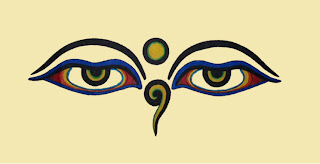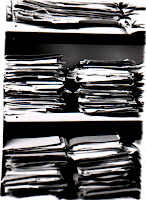Another chapter in the serialized 1981 travel adventure which Walhydra first published on The Crone Thread in 1997.Part 2: In which Walhydra discovers that Buddhist equanimity can be a rather expensive pain in the ass
The general plan which Walhydra and Nikki had for their Asian pilgrimage was to head east from New Delhi to the Ganges, north to Nepal, then on to Thailand and perhaps even Japan…as far as their bankrolls would take them.
The first leg of the journey was a trip by rail of some 500 miles through the heart of northern India to Varanasi, the sacred Hindu city on the Ganges. They stopped for a few days in Agra to visit the full moon mystery that is Taj Mahal. Then they set off across country.
Traveling second class with the "other" commoners, Walhydra marveled at the ageless, pre-mechanized agrarian culture which stretched out around them.
 She knew better than to romanticize what she saw. Peasant life was obviously difficult.
She knew better than to romanticize what she saw. Peasant life was obviously difficult.
Nonetheless, there was a blessèd steadfastness to it. A stolid forward movement, like the pace of an ox which Walhydra had watched one day in Agra as it pulled a plow. In that crystalline white light of India, the great creature had existed only one step at a time, advancing to the end of a long row, turning, marching back, like the slow turning of the wheel, the rhythm marked only by its steps and the chewing of its cud.
In that crystalline white light of India, the great creature had existed only one step at a time, advancing to the end of a long row, turning, marching back, like the slow turning of the wheel, the rhythm marked only by its steps and the chewing of its cud.
Life itself, plain and unvarying, yet adorned by the shocking magenta flags of bougainvillea which hedged the field.
Just as she had been mesmerized by that ox, Walhydra was mesmerized by the rolling country as it passed by.
After some hours of watching the countryside pass by, still mesmerized, Walhydra stood to stretch...thereby committing the error for which Dr. Mesmer himself had been waiting. For the first time in all their travels, she left her leather pouch behind on the seat when she stood.
Kali shrugged.
"Nikki? Where's my pouch?" said Walhydra, already knowing it had vanished. As had her wallet, IDs, traveler's cheques, passport….and pilgrimage.
Walhydra was surprised at her own coolness.
She and Nikki had been seated with their backs to the car in an open booth of facing seats, just like those which stretched down the aisle on both sides behind them.
Walhydra stood calmly in the aisle in view of everyone. Breathed calmly. Watched with unfocused gaze for countless minutes.
Sat back down.
"I know who it is," she said to Nikki. A man in the next booth had gradually grown more antsy as Walhydra kept her vigil.
Nikki stood and watched in the same way.
"You're right," he said when he returned. "But we can't do anything about it. We can't accuse him, and the Authorities on the route won't be concerned. We'll just have to wait till Varanasi."
Walhydra was stoic. Brave. She sat back and tried to resume her stolid, ox-like pose of living in the moment.
Six hours of stoicism later, the fumes were starting to rise from her ears.
The next morning, after a restless night in a Varanasi hotel room paid for by Nikki, the smoke started billowing as an official shrugged officiously and explained that the passport could only be replaced at the American Embassy.
Back in New Delhi. Half way across the country.
By the time they regained New Delhi two days later, flames were sprouting. (Nikki, of course, kept his obnoxious Aquarian cool.)
Now, what were all the mental pyrotechnics about?
Walhydra, of course, was not really at all stoical. Or brave. Or Buddhist, or...whatever.
Walhydra admired—envied—people who could, so they said, accept change with equanimity. (Like obnoxious Aquarian husbands, for instance.)
The heart of the Buddhist practice made perfect sense to her. It seemed neat, precise, efficient...just what a Virgo aspires to.
To acknowledge what happens in the moment without clinging to one's emotional or sensual responses.
To let imagined possibilities which had not yet happened flow past one, without fending them off or grasping after them.
To allow the past and the future to remain as mere, changeable thought traces, rather than as forces which operate upon one in the present. It all sounded wonderful.
It all sounded wonderful.
And there, you see? "Wonderful."
In other words: "I want to have this. This enlightenment, this spiritual ability, this power."
Walhydra was not so much of a fool as not to recognize the dangerous paradox in desiring enlightenment. Yet—the gentle reader will certainly acknowledge—it felt like such a perversely unfair deal.
"When you cease desiring this it will come to you."
Boo, hiss!
In any case, the slowly building rage in Walhydra's chest was stoked higher at each step away from the future—that journey to the East—which she had expected. And each willful or capricious event which obstructed her from recovering that future was like another coal on the fire.
While she did her best to act as if she were enlightened, Walhydra actually kept a firm and resentful grasp on the rapidly vanishing moment back at Allahabad Station when she stood up without her pouch.
What's more, remember, this was India. THE original human experiment, by Walhydra's own reckoning.
The pilgrimage which, as far as she was concerned, had been stolen was, in fact, still progressing. One city, one room, one mind is large enough for pilgrimage if one is paying attention.
However, since Walhydra's attention was stuck back in Allahabad, a lot slipped by her until—many years later—she was able to look back and recognize the rubies glowing in the mud with which she had been preoccupied.
Mud and rubies are both equally valid manifestations of the physical, but for the next three weeks, it was the mud to which Walhydra perversely clung. And perhaps the worst of the mud—to confuse the metaphor—was made out of paper.
Consider this….
During their years under the British Empire, the Indians had obviously managed to appreciate and extract from their overlords the essence of British bureaucracy. The whole point, they had realized, was to gain a civil servant position and then hold onto it at all costs. All forms, all policies and procedures, all filing systems, were merely tools for deflecting work. And the sole purpose of any bureaucratic transaction was to acquire, stamp and re-file a piece of paper—or to refuse to do so.
All forms, all policies and procedures, all filing systems, were merely tools for deflecting work. And the sole purpose of any bureaucratic transaction was to acquire, stamp and re-file a piece of paper—or to refuse to do so.
Hence, each step in Walhydra's process of recovering traveler's cheques and permission to travel required several trips over several days to several different bureaus. Remember that this was the pre-computerized world. Electronic records and transactions were just someone's daydream in Silicon Valley. Instead, Walhydra was met at each stop with clerks at old fashioned teller's windows, loomed over by pillars of ledgers in countless dusty and yellowed array.
Remember that this was the pre-computerized world. Electronic records and transactions were just someone's daydream in Silicon Valley. Instead, Walhydra was met at each stop with clerks at old fashioned teller's windows, loomed over by pillars of ledgers in countless dusty and yellowed array.
In a future chapter we will relate the concurrent adventure of recovering the U.S. passport, since that story has its own delights. Perhaps we'll toss in a little travelogue as well, for fun.
For the present, though, we now skip over two weeks of dusty civil servants to bring the reader to what one might call the masterstroke of the "experimental design."
After many sidetracks and false starts, one day Walhydra and Nikki set off on an hour long bus trip across New Delhi to acquire a new tourist visa for Walhydra. This would presumably remove the last obstacle to getting back on the road.
Given the vast subtlety of a people with hundreds of deities, however, Walhydra should not have been surprised. She arrived, after all this ordeal of theft and recovery, at the Foreign Registry Office, only to be informed that, in fact, she was the criminal.
"You have no visa. Therefore you are in this country illegally."
"But one of your people stole my passport!"
"I do not know that."
Stolid, like an ox.
"This British citizen and I are traveling together. We flew into Bombay from Athens. Then somebody stole my passport."
"You have no tourist visa with you. I can only assume that you may have entered illegally."
Existing only one step at a time.
"How do I prove otherwise?"
"You must retrieve your entry documents."
Turning at the end of the row.
"How do I do that?"
"Why, obviously. You must return to your point of entry."
Marching back.
"What?! To Bombay! That's 1000 miles away!" "Yes, sir."
"Yes, sir."
Blaze of magenta blossoms at the edge of the field.
[Continued in WWSA, Part 3]
No comments:
Post a Comment